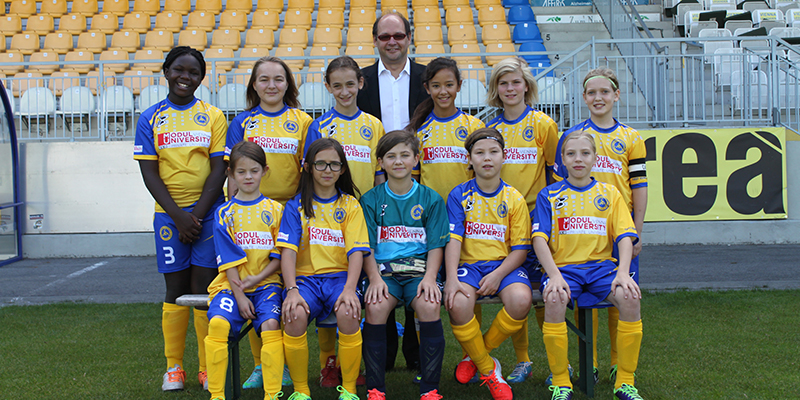Joining the Vienna revolution
September 30, 2014
MODUL University fosters education and personal development not only for our current students and alumni, but also takes an active role in supporting other young people (and possible future Modulians!) to reach their goals. The university sponsors the under-12 girls’ soccer team from First Vienna, the oldest soccer club in Austria.
Football expert Graham Bates shared his account of the recent match at Hohe Warte, First Vienna’s home stadium in the district of Döbling where Modul University is located, and history about the First Vienna club, founded in 1894.
‘’Over the PA system the name of MODUL University Vienna rang out as the announcer thanked our friends on the Kahlenberg for their support. The crowd cheered their approval.
A few minutes later the three teams took to the pitch. It was Friday night and the men of First Vienna FC where about to take on the men of SV Stegersbach in the Austrian Regional League East. Accompanying them onto the Hohe Warte pitch were the First Vienna U12 Girls wearing their new MODUL University sponsored football kit. Having with the men taken the salute of the crowd from the centre circle, the girls gathered at the edge of the pitch to give the photographers a chance to take their pictures. The crowd of over 800 cheered and shouted their support - as is traditional at Vienna this was on in both German and English.
Vienna is a club were tradition and revolution goes hand in hand. It’s also a club where German and English goes hand in hand. The clues are there in the name. The clubs name is in English. ‘First’ refers to the fact that they were the first football team officially registered in Austria. The founders were mostly British gardeners working for Rothschild. At their first ever match they played in front of a crowd of around one hundred – mostly British – against the ‘Cricketers’ who had registered shortly after Vienna. The football team of the Vienna Cricket and Football Club would in 1911 become the ‘Wiener Amateur Sports Association’ and then in 1926 ‘Austria Wien’.
 Austrian football in the 1920’s and 30’s was a powerhouse for the development of the modern game. The Hohe Warte, built in 1921 and considered the best sporting venue in Europe at that time, hosted many of the Austrian National Team games.
Austrian football in the 1920’s and 30’s was a powerhouse for the development of the modern game. The Hohe Warte, built in 1921 and considered the best sporting venue in Europe at that time, hosted many of the Austrian National Team games.
In recent years First Vienna FC has been part of a new revolution in Austrian Football, the growth of the Women’s and Girl’s games.
MODUL University is sponsoring the U12 Girls who last year, as the U11’s, were virtually unbeatable playing against other girls teams both domestic and international. On Sunday they played their third league match (playing in a league with boys teams) securing an 11:1 win and making it three out of three for the season. The game also marked the first occasion the girls played a competitive game wearing the MODUL University sponsored kit.
Vienna also has a successful U14 Girls team playing in a league against boys. At the senior level the club has an A and B team playing in the Women’s league.
Of course the club’s boy’s teams and the senior men’s teams should not be forgotten. The latter have started well in the Austrian Regional League East and the atmosphere at home games with a knowledgeable, positive, crowd singing in English and German – often accompanied by the lone bagpipe player – is worth experiencing.
The Hohe Warte has been the venue for a great deal of Austrian football history. Located a few minutes’ walk from U4 Heiligenstadt station, the stadium is on the route to and from the university for many MODUL University students and staff. Whether student, Vienna resident or visitor, if you like football or simply want to experience the mix of history and culture that unites the German and English speaking world, the Hohe Warte sits on your doorstep.
In ten years from now people could well be talking about the significant role First Vienna played in the development of Girls and Women’s football. Will you be one of those who say ‘Oh yes, I heard something about that’ or one of the lucky ones who say ‘Ah yes! We joined the revolution’.’’





